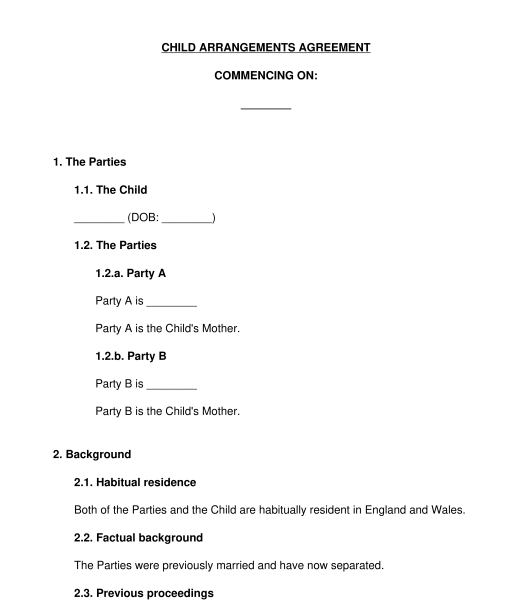 14/11/2025
14/11/2025

Answer a few questions and your document is created automatically.

Your document is ready! You will receive it in Word and PDF formats. You will be able to modify it.

 14/11/2025
14/11/2025
 Word and PDF
Word and PDF
 4 to 5 pages
4 to 5 pages
A child arrangements separation agreement can be used to set out an agreement between separated parents in England and Wales in relation to child arrangements. Child arrangement separation agreements used to be referred to as 'custody agreements'.
The agreement will specify with whom a child or children will live and the time they will spend with the other parent. It is also possible to make a record of any important parenting decisions in the agreement. The child arrangement separation agreement can be used by parents who have separated already or who have made the decision to separate in the future.
A child arrangements agreement is primarily used to define the living arrangements for the child or children, and the time they will spend with the non-resident parent.
A child maintenance agreement will set out any agreement reached in relation to the financial arrangements for the children. Typically, this will specify the financial contributions made by the non-resident parent.
No. It not mandatory to have a child arrangements agreement. Some parents decide that they do not need to write down the agreement about the child arrangements when they separate. However, a written agreement can help to evidence and provide a written record of the agreement between the parties. In the event that the arrangements break down in the future, a parent might wish to apply to the Court and this document can help to explain what the pre-existing arrangement was.
Similarly, if the parties do have a Child Arrangements Order in place and would like to vary this by agreement, they will wish to do this in writing*. A Child Arrangements Order is an order made by the family court, which sets out the living and contact arrangements for a child.
The arrangements under a Child Arrangements Order should only be changed if the court order says that the arrangements may be varied in writing through an agreement between the parties.
Parental responsibility is the legal term for the rights and responsibilities held by a parent or legal guardian of a child. A person might automatically hold parental responsibility, or they might acquire it via a legal process (such as a legal agreement or a court order).
Contact is the term used to describe the time that a non-resident parent will spend with a child.
Before creating and signing this agreement, the parents will need to discuss and agree on the contents of this.
If the parents are amending an existing court-ordered agreement, they must carefully check that there is a clause or provision in the court order which permits them to vary the court order through a written agreement.
The parties should also ensure that they are satisfied that they do not have any safeguarding concerns about the other party before they enter into this type of agreement.
The parties to a child arrangements agreement will typically be the parents of the children.
This agreement can last until the children are the age of 16. The parents can agree to review and update the agreement at specified periods. The agreement can be altered and superseded by an order of the court.
The document should be signed by both parties to evidence their agreement and each party should retain a copy to refer to. The parties can amend and revise the document as required.
If there is an existing court order, which is to be varied by agreement, the existing order can be attached to the agreement.
A written child arrangements agreement cannot be brought before the Family Court for enforcement. However, a written child arrangements agreement can be used in a future court application as evidence of the existing agreement. The parties might wish to apply to the Family Court to formalise the agreement as a consent order. The Family Court can refer to the terms of the agreement reached and, if deemed appropriate, encapsulate the terms of the agreement in a court order.
If a written agreement is used to vary an existing Child Arrangements Order, this may be deemed to be legally binding if there is a clause or provision in the court order which permits the parties to vary court order through a written agreement.
If a parent does not adhere to the agreement in the future, it is possible for either parent to make a referral to mediation or make an application to the Family Court. The Family Court cannot make an enforcement order in relation to the agreement itself, but it can consider the written agreement as evidence of the existing arrangements when deciding what court order to make.
An agreement should:
The primary piece of legislation which governs the rights and responsibilities of parents and children is the Children Act 1989.
You fill out a form. The document is created before your eyes as you respond to the questions.
At the end, you receive it in Word and PDF formats. You can modify it and reuse it.
A guide to help you: Signing Documents in England and Wales
Child Arrangements Separation Agreement - Template
Country: United Kingdom